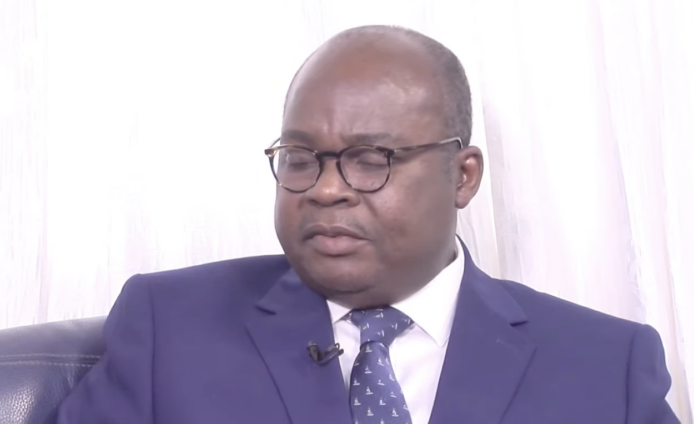
Audio By Carbonatix
The Governor of the Bank of Ghana (BoG), Dr Ernest Yedu Addison, provided a detailed account of the banking sector crisis that plagued Ghana in 2017.
He recounted the drastic measures taken to salvage the sector and establish a more robust financial ecosystem.
A sector on the Brink
“When I took office in 2017, the banking sector was in a near state of collapse,” Dr. Addison revealed.
“People were queuing to withdraw their money. The International Monetary Fund (IMF) flagged this as the most pressing crisis facing the country at the time.”
The severity of the situation demanded swift and decisive action, he explained, with the immediate priority being to stabilize the sector and restore public confidence.
License revocations and clean-up
One of the first steps involved the revocation of licenses for two banks, Capital Bank and UT Bank, in August 2017.
“This was part of the prior actions to address the sector’s insolvency,” Dr Addison noted. Over the following years, additional weak and insolvent institutions were removed from the system.
“By 2019, the sector had been cleaned up,” he said.
“We had removed all the weak institutions and those that remained met the new capital requirement of ¢400 million. These banks had stronger capital, adhered to new corporate governance directives, and were being properly supervised.”
Dr. Addison highlighted some of the issues that necessitated these license revocations, including insider trading, related-party transactions, and non-compliance with prudential rules.
“These practices undermined the stability of the banking system, but through stricter scrutiny and governance reforms, we have addressed them,” he affirmed.
A Stronger Sector, Yet New Challenges
Despite the strides made, Dr. Addison acknowledged that the post-cleanup era presented new challenges.
“The banks were in a much better place by 2019, with stronger capital to support growth. Interest rates had come down from 28% to around 21%, creating an environment conducive to lending to the private sector,” he explained.
However, the onset of the COVID-19 pandemic disrupted this trajectory. “Suddenly, the government became the main borrower in the economy.
The banks, instead of lending to the private sector, channelled their recapitalized resources into acquiring government bonds,” Dr Addison said.
Debt Exchange and Its Impact on Banks
The government’s rising debt levels and eventual inability to secure further borrowing from capital markets triggered a debt crisis, further complicating matters for banks. “The debt exchange program resulted in significant losses for the banks,” Dr. Addison admitted.
Despite these setbacks, he maintained that the reforms initiated during the crisis have left the banking sector in a stronger position to navigate economic challenges. “The decisions we made were difficult, but they were necessary to restore stability and create a banking sector that can withstand shocks,” he stated.
Looking Ahead
Dr. Addison stated that the lessons learned from the crisis have informed ongoing reforms to strengthen the financial sector.
“Our focus remains on ensuring that banks are well-capitalised, properly managed, and capable of supporting sustainable economic growth,” he concluded.
Latest Stories
-
Abu Trica sues Interior Minister, AG, NACOC, FBI and EOCO; Demands GH₵10m in damages
4 minutes -
Nkwanta South MCE commissions new classroom block at Mmen Akura JHS
15 minutes -
Prosecute Amansie Central DCE to deter others – Suame MP
18 minutes -
GenCED demands accountability over Vote-Buying in Ayawaso East NDC Primary
19 minutes -
Project Ghana as reliable global partner – Mahama tells new ambassadors
19 minutes -
Sofoline vendors credit sanitation campaign for better health and sales
29 minutes -
‘Arrest him now’ – Ashigbey demands DCE’s arrest over ‘A Tax For Galamsey’ expose
29 minutes -
NDC’s decision to probe voter inducement a good step – Political analyst
31 minutes -
Over $100m your gov’t spent on National Cathedral could’ve completed half of Suame Interchange – Agbodza to Asenso-Boakye
35 minutes -
How Lindsay-Gamrat built Atlantic Catering into a 600-employee business in 10 years
36 minutes -
NPP Kpando leaders call for unity and renewed focus on 2028 after primary
37 minutes -
A Tax For Galamsey: JoyNews exposé links DCE to GH₵6,000 ‘galamsey fees’
41 minutes -
Chāo-Shì launches platform to create portable digital reputations for informal workers
46 minutes -
Nkenkaasu 24-Hour Economy Market
49 minutes -
Outer ring road makes Suame four-tier design obsolete – Roads Minister
50 minutes

